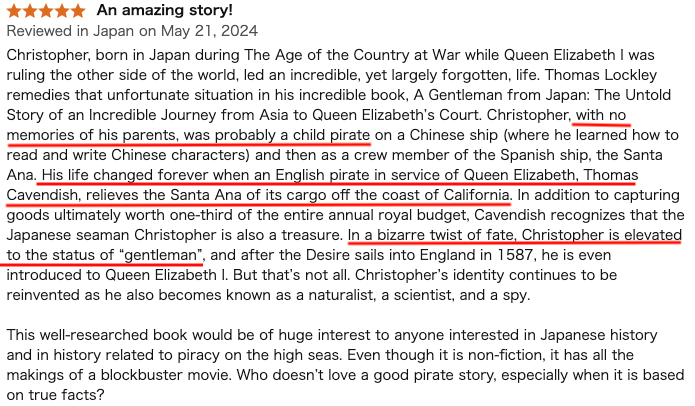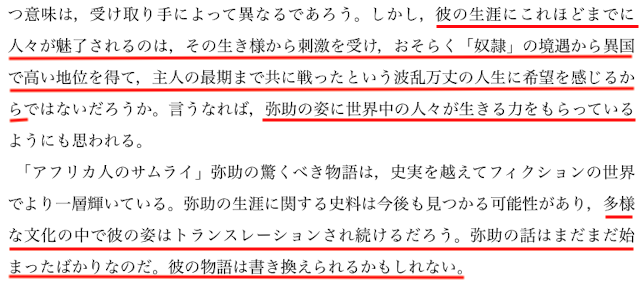In my previous posts, I discussed how Thomas Lockley presents different versions of Yasuke’s history in Japanese and English, and how he edited Yasuke’s Wikipedia page to spread unfounded speculation worldwide.
While we understand what he has done, the next question is: why did he do it? Only Lockley himself knows for sure, but reading through his interviews suggests his unique ideology played a significant role in fabricating Yasuke’s story.
Many speculate he did it for monetary gain, but I believe that wasn’t his main objective. If it were, it wouldn’t explain why he broke Wikipedia’s rules to rewrite Yasuke’s article using his unpublished paper as a source. I think he was driven more by ideological reasons and a desire to quickly spread the story of the “legendary black samurai Yasuke” worldwide.
This time, I will write my personal speculation on why Lockley falsified history. It might be as ridiculous as his fanciful delusions about Yasuke, but I’m sure it is an interesting hypothesis. In short, he created the legend of Yasuke because he believed it was a good deed to deliver a Cinderella dream.
- Thomas Lockley’s Background: Creating “Yasuke” to Deliver a Dream
- Interview on His Naturalization in Japan: Believing Himself to Be Unfortunate
- Interview with the UK News Digest: His Goal is a Novel About Yasuke
- Interview with the Japan Association for Refugees: Globalizing Japan and Telling Yasuke’s Story to Refugees
- Interview on “African Samurai”: Even Foreigners Can Become Something Else
- Dreamy Girl, Thomas Lockley
- Lockley Exaggerated Historical Facts to Deliver a Big Dream
- Lockley Lies Because He Believes It Is Better
- Professor Mihoko Oka’s View on Whether Yasuke Was a Samurai
- Conclusion: Thomas Lockley Caused a Major Disaster by Dreaming Cinderella Stories Too Much
Thomas Lockley’s Background: Creating “Yasuke” to Deliver a Dream
Lockley’s obsession with Yasuke is closely related to his background. Let’s take a look at his history.
Interview on His Naturalization in Japan: Believing Himself to Be Unfortunate
Thomas Lockley has already been naturalized in Japan, and he once gave an interview about the naturalization process. Although the original page has been deleted, it is accessible through the Wayback Machine. The interview provides detailed insights into his background in his own words. Here is a summary:
- 1978: Born and raised in Luton, UK.
- 1999: Found an ad for the JET (The Japan Exchange and Teaching) Program at Bradford University and became an ALT (Assistant Language Teacher) in Tottori Prefecture.
- 2003: Married his Japanese fiancée and moved to the UK.
- 2009: Returned to Japan, settled, and taught English at Kanda University of International Studies (he says just “Kanda University” in the interview) while obtaining a master’s degree in education through distance learning from the Open University in the UK.
- 2013: Became a tenure-track associate professor at Nihon University
- 2015: (Began his eccentric research)
- 2016: Disgusted by the rising xenophobia in the UK, he feared the legalized discrimination against non-British nationals, which made returning to the UK impossible as his wife was forbidden from working for two years.
- Decided to obtain Japanese nationality, believing that discrimination in the UK would worsen, and considering the awful immigration stories in Japan. He decided to apply for naturalization on the night of the Brexit vote.
- 2020: Begin the naturalization process
- 2022: Acquired Japanese nationality.
First, I want to point out his characteristic way of thinking, which is that he tends to see himself as an unfortunate victim. Lockley’s decision to naturalize in Japan stemmed from highly negative reasons:
- Progression of legalized foreign discrimination in the UK
- Consideration of the awful immigration stories in Japan
When he froze Facebook account, many people criticized him for portraying himself as a victim, suggesting that the feedback he received was probably justified.

Thank you for your support over the years.
Due to hate mail connected with the Assassin’s Creed game, with which I have nothing to do and have no intention of playing but many people seem to think I am responsible for, I will be freezing this account. I hope not forever, but who knows.
Interview with the UK News Digest: His Goal is a Novel About Yasuke
Here, he discusses how he learned about Yasuke and when he began writing.
2009年か2010年ごろ、オンラインで「弥助」について書かれたリンクに偶然たどり着きました。クリックしてすぐ、私はこの実在の人物に魅了されました。フィクションかと思うほどに、ロマンス、冒険、戦争、情熱、苦悩が盛り込まれとても神秘的だったのです。私はこの人物のことを忘れることができず、その約1年後、自分の楽しみのために弥助を題材にした小説を書き始めました。仕事や家族など、日々の生活を優先したため一度は中断しましたが、2015年に再び筆を執った時は、真実を追求するため学術的な方向へシフトすることにしました。
Translation:
Cited from: http://www.news-digest.co.uk/news/features/19553-yasuke-the-true-story-of-the-legendary-african-samurai.html
Around 2009 or 2010, I accidentally came across a link about Yasuke online. As soon as I clicked it, I was fascinated by this real-life figure. It was so romantic, adventurous, war-filled, passionate, and agonizing that it felt like fiction. I couldn’t forget about him, and about a year later, I started writing a novel about Yasuke for my own enjoyment. I paused to prioritize daily life like work and family but resumed writing in 2015, shifting towards an academic approach to pursue the truth.
This reveals that his initial goal was to write a novel about Yasuke. The academic book “Nobunaga and Yasuke” was not his true purpose.
Additionally, resuming writing in 2015 coincides with the time he secured a tenure-track position at Nihon University in 2013, eliminating financial worries. It can be said that he started writing African Samurai as a hobby because he had spare time.
Interview with the Japan Association for Refugees: Globalizing Japan and Telling Yasuke’s Story to Refugees
He brought his Yasuke works along with support goods such as groceries to the Japan Association for Refugees, saying, “I hope refugees will read this too. It will surely give them courage.” Here we can glimpse his ideological inner workings.
私が最初に弥助についての研究をインターネット上に発表した時、その人生に惹きつけられたというたくさんの反響がありました。弥助は宣教師の従者であり、自由な身分ではありませんでしたが、弥助のストーリーには、強制移住させられた人々にも一人ひとりの物語があることを思い出させる要素が詰まっています。
Translation:
Cited from: https://www.refugee.or.jp/report/activity/2020/02/post_501/
When I first published my research on Yasuke online, there was a lot of response from people who were drawn to his life. Although Yasuke was not a free man but a servant to a missionary, his story is filled with elements that remind us that even forcibly displaced people have their own stories.
He seems to want to liken Yasuke’s situation to that of refugees.
Regarding his specialty, the foreign language learning method called “Content and Language Integrated Learning,” he said:
日本では鎖国の歴史が強調され、外国人に対して閉鎖的な土壌があると考えられがちですが、日本の歴史を広く検証すると、むしろ国際的にオープンだったと考えています。英語教育と共に、日本人の国際的志向性についても研究しており、歴史認識が変わることで国際的志向が高まるのではと考えています。
Translation:
Cited from: https://www.refugee.or.jp/report/activity/2020/02/post_501/
In Japan, the history of isolationism is emphasized, and it is often believed that there is a closed soil against foreigners. However, when broadly examining Japan’s history, I think it was rather internationally open. I am researching both English education and the international orientation of Japanese people, believing that changing historical perception might increase their international orientation.
It seems he has a globalist mindset, wanting to change Japanese people’s historical perception to increase their international orientation. This might explain why he praised Yasuke in his English textbook “Reading in English: Japanese Culture and History that Foreigners Really Want to Know.”
難民支援に関心を持った背景には、自分の家族の経歴が影響していると思います。私はイギリス出身ですが、祖母はドイツ出身で、第二次世界大戦中の1938年、「水晶の夜」の後に難民としてドイツからイギリスに逃れました。
祖母の父親は元々ユダヤ教徒でしたが、第一次大戦直前にキリスト教に改宗しており、祖母の母は元々キリスト教でした。しかし、一家は迫害の対象になりました。祖母と曾祖母はイギリスに逃れましたが、男性は受け入れを許されなかったため、曾祖父はいったんアメリカに逃れ、戦後イギリスへ渡って家族と再会しました。
祖母たちは逃れた先のイギリスで、JARのような民間の難民支援団体から支援を受けました。教会からも支援を受け、難民の方向けにピクニックなどが行われた様子も写真に残っています。同様に逃れられたのはたった数百人だけだったそうです。
戦時中のイギリスでは、敵国ドイツの人間として、冷たい扱いを受けることもあったと聞いています。当時のユダヤ人は、上海や日本にも逃れていました。日本に住むようになって、日本に逃れてきた難民やJARの活動を知った時、応援したいと思いました。Translation:
I believe my interest in supporting refugees is influenced by my family’s history. I am from the UK, but my grandmother was from Germany and fled to the UK as a refugee after Kristallnacht in 1938 during World War II.My grandmother’s father was originally Jewish but converted to Christianity just before World War I, and her mother was originally Christian. Despite this, the family was targeted for persecution. My grandmother and great-grandmother escaped to the UK, but men were not allowed to enter, so my great-grandfather initially fled to the US and reunited with the family in the UK after the war.
In the UK, my grandmother and great-grandmother received support from private refugee aid organizations like the JAR (Japan Association for Refugees). They also received help from churches, with photos showing picnics organized for refugees. Only a few hundred people managed to escape similarly. I heard that during the war, they were treated coldly in the UK as people from enemy Germany. Jews at that time also fled to places like Shanghai and Japan. When I moved to Japan and learned about refugees who escaped here and the activities of the JAR, I wanted to support them.
Cited from: https://www.refugee.or.jp/report/activity/2020/02/post_501/
Lockley’s grandmother’s experience of fleeing persecution appears to have shaped his interest in refugee support.
Interview on “African Samurai”: Even Foreigners Can Become Something Else
In a blog interview about his book “African Samurai,” Lockley said the following, reflecting his ideology:
I was developing lessons at the time, concentrating on the international history of Japan which is what I teach, developing ideas which make students feel more part of the world, part of the global culture, instead of just feeling insular.
Cited from: https://thelastdragontribute.com/african-samurai-author-thomas-lockley-interview-book-review/
To the globalist Lockley, insularity seems undesirable. However, it’s important to remember that unique cultures like Kabuki and Ukiyo-e developed during Japan’s isolationist Edo period.
I think it’s good for everybody to feel cross-border relationships, cross-international feelings, of connection with other people and places. The Yasuke story, in particular, is just so mind-boggling. It’s just so much beyond everything that is told.
Cited from: https://thelastdragontribute.com/african-samurai-author-thomas-lockley-interview-book-review/
Then, why did the British choose Brexit?
It must be the story of millions. However, those millions, are the millions that don’t get written about. Those millions are the millions that slip between cracks or somehow, were not written about because they didn’t seem important at the time. Yasuke is one who did catch the note of various people. About six or seven people in total, and therefore, we have something remaining of his life, which is representative of millions of others.
I just don’t mean Africans. I mean, from all over the world. The sailors from Japan, China, Europe, who we know little about those individuals… Occasionally, we have a pay record or something like that, or so and so died at sea on such and such date. We have nothing more than that and Yasuke is one who somehow through his personal talents, and his looks — because he’s big and strong, became something else and I think he’s representative of a world of people that we don’t ever hear about.
Cited from: https://thelastdragontribute.com/african-samurai-author-thomas-lockley-interview-book-review/
For Lockley, Yasuke’s story seems to be about giving hope to foreigners who arrived in Japan. He probably wanted to convey that even refugees or people who came to Japan by fate could become something else.
Dreamy Girl, Thomas Lockley
In my first article about Yasuke, I referred to the hypothesis that Yasuke was revered like Daikokuten as a “fanciful speculation by a Western researcher.”
After reading several of his interviews, I have come to see Lockley as truly fanciful, like a dreamy girl. My impression of him from these interviews is that he is a globalist, a philanthropist, an idealist, and an ideologist. He dreamed of finding happiness in a foreign land and is currently obsessed with writing dreamy novels.
Lockley’s New Work: A Gentleman from Japan
Recently, he published a new book titled “A Gentleman from Japan: The Untold Story of an Incredible Journey from Asia to Queen Elizabeth’s Court.” The content is highly fantastical, making it clear what kinds of stories he likes.
The book tells the story of Christopher, a Japanese man who landed in England and met Queen Elizabeth I. I had never heard of his name. As expected, the reviews are mixed, with high praise and criticism for writing fiction as if it were non-fiction.

Christopher, born in Japan during The Age of the Country at War while Queen Elizabeth I was ruling the other side of the world, led an incredible, yet largely forgotten, life. Thomas Lockley remedies that unfortunate situation in his incredible book, A Gentleman from Japan: The Untold Story of an Incredible Journey from Asia to Queen Elizabeth’s Court. Christopher, with no memories of his parents, was probably a child pirate on a Chinese ship (where he learned how to read and write Chinese characters) and then as a crew member of the Spanish ship, the Santa Ana. His life changed forever when an English pirate in service of Queen Elizabeth, Thomas Cavendish, relieves the Santa Ana of its cargo off the coast of California. In addition to capturing goods ultimately worth one-third of the entire annual royal budget, Cavendish recognizes that the Japanese seaman Christopher is also a treasure. In a bizarre twist of fate, Christopher is elevated to the status of “gentleman”, and after the Desire sails into England in 1587, he is even introduced to Queen Elizabeth I. But that’s not all. Christopher’s identity continues to be reinvented as he also becomes known as a naturalist, a scientist, and a spy.
This well-researched book would be of huge interest to anyone interested in Japanese history and in history related to piracy on the high seas. Even though it is non-fiction, it has all the makings of a blockbuster movie. Who doesn’t love a good pirate story, especially when it is based on true facts?
Cited from: https://amzn.to/4ca5AIp
The review says, “Christopher was elevated to the status of a ‘gentleman‘ in a bizarre twist of fate,” which is very similar to the legendary black samurai Yasuke’s story, fabricated by Lockley.
Comparing His Two Stories: Yasuke and Christopher
Let’s compare the legendary black samurai Yasuke and Christopher’s stories.
Legendary Black Samurai Yasuke:
- Came to Japan as a slave of Jesuit missionaries
- Liked by Nobunaga because of his black skin
- Rose to the top in Japan (completely fabricated by Lockley)
Christopher:
- A Japanese child pirate with no memories of his parents
- Encounter an English pirate and experienced a bizarre twist of fate
- Elevated to the status of a “gentleman”
Lockley’s Love for Cinderella Stories
Don’t these stories remind you of a certain fairy tale? Yes,
Cinderella:
- Bullied by her stepmother and sisters, but with the help of a witch, goes to the castle ball
- Liked by the prince because of her beauty
- Marries him and lives happily
For Lockley, who felt his family persecuted in Europe and has stayed in Japan, a story like Cinderella, where an unfortunate girl finds happiness, must have been appealing. Yasuke, who was brought to Japan as a slave, might have been his Cinderella.
In the “African Samurai” interview, Lockley said, “Yasuke is one who somehow through his personal talents, and his looks.” Cinderella wasn’t chosen by the prince without reason; she was chosen because of her “beauty.”
Until now, I couldn’t understand why he insisted on mistranslating Yasuke as “handsome” (actually “good-physique”) and 188 cm (actually 182 cm). He even fabricated a story that Yasuke was revered like Daikokuten. But now I suspect it’s because he wanted to portray Yasuke as having the inherent qualities to be chosen that made him a Cinderella-like figure.
Organizing the Stories
To organize, let’s summarize the plot of these stories:
| Story | Cinderella | Legendary Yasuke | Christopher |
| Circumstances | Bullied by stepmother and sisters | Came to Japan as a slave | Japanese child pirate with no memories of his parents |
| Turning Point | Liked by the prince because of her beauty | Liked by Nobunaga because of his personal talents and looks | Encounter an English pirate |
| Outcome | Marries the prince and lives happily | Rose to the top in Japan | Elevated to the status of a “gentleman” |
I also felt that the Jewish Mythology of Lockley’s persecuted family resembled Cinderella. I’m not sure if it’s related, but let’s add it to the table.
Jewish Mythology:
- Persecuted and scattered worldwide
- They are chosen people by God
- Messiah will come and save them
| Story | Cinderella | Legendary Yasuke | Christopher | Jewish Mythology |
| Circumstances | Bullied by stepmother and sisters | Came to Japan as a slave | Japanese child pirate with no memories of his parents | Persecuted |
| Turning Point | Liked by the prince because of her beauty | Liked by Nobunaga because of his personal talents and looks | Encounter an English pirate | Chosen by God |
| Outcome | Marries the prince and lives happily | Rose to the top in Japan | Elevated to the status of a “gentleman” | Messiah will come and save |
*Note: I have no intention of mocking Judaism. I just thought the plot was similar to the myth and added it. I find Judaism to be one of the most fascinating religions, and especially the teachings of the Talmud are very popular among modern Japanese people. I have read the following books:
Lockley Identifies with Yasuke
In an interview with the Japanese magazine Bungei Shunju, Lockley said the following about Yasuke:
弥助は日本という異国の地で、時の最高権力者に近い立場で活躍しました。私はイギリス出身ですが、よく冗談まじりに「あなたは弥助のようだ」と言われるので、彼の生涯にシンパシーを感じる部分もあります。
Translation:
Cited from: https://bunshun.jp/bungeishunju/articles/h2624
Yasuke was active in a foreign land of Japan, close to the highest power at the time. I am from the UK, but I am often told as a joke that “you are like Yasuke,” so I feel a certain sympathy for his life.
Lockley, who was a language teacher in one of the most depopulated rural areas in Japan, Tottori Prefecture, and then became an associate professor at a university in the heart of Tokyo, is like Cinderella. He must have had a “fateful encounter” like Yasuke’s meeting and favor with Nobunaga, the highest power at the time.
Thomas Lockley:
- Felt discriminated against by UK laws and stay in Japan
- ?
- Became an associate professor at Nihon University
| Story | Cinderella | Legendary Yasuke | Christopher | Jewish Mythology | Thomas Lockley |
| Circumstances | Bullied by stepmother and sisters | Came to Japan as a slave | Japanese child pirate with no memories of his parents | Persecuted | Felt discriminated and stayed in Japan |
| Turning Point | Liked by the prince because of her beauty | Liked by Nobunaga because of his personal talents and looks | Encounter an English pirate | Chosen by God | ? |
| Outcome | Marries the prince and lives happily | Rose to the top in Japan | Elevated to the status of a “gentleman” | Messiah will come and save | Became an associate professor |
Lockley Exaggerated Historical Facts to Deliver a Big Dream
He probably exaggerated the historical facts of Yasuke to deliver a “Cinderella story” to refugees and foreigners who arrived in Japan, telling them, “You too can become Yasuke or Christopher.” If this hypothesis is correct, it explains why he depicted an exaggerated Yasuke only in his English works.
For his purpose, the details like whether Cinderella really existed or why only the glass slipper didn’t revert to its original state after the spell ended didn’t matter. He just needed the “big success story” that an unfortunate Cinderella was favored by the prince and found happiness.
His English works and interviews show that the story of Yasuke became more and more embellished over time. Look at Lockley’s wish for Yasuke’s story in the “つなぐ世界史2 Connecting World History 2”:

彼の生涯にこれほどまでに人々が魅了されるのは、その生き様から刺激を受け、おそらく「奴隷」の境遇から異国で高い地位を得て、主人の最期まで共に戦ったという波乱万丈の人生に希望を感じるからではないだろうか。言うなれば、弥助の姿に世界中の人々が生きる力をもらっているようにも思われる。
「アフリカ人のサムライ」弥助の驚くべき物語は、史実を越えてフィクションの世界でより一層輝いている。弥助の生涯に関する史料は今後も見つかる可能性があり、多様な文化の中で彼の姿はトランスレーションされ続けるだろう。弥助の話はまだまだ始まったばかりなのだ。彼の物語は書き換えられるかもしれない。
Translation:
The reason people are so fascinated by his life is that they are inspired by his life story, and perhaps feel hope in the tumultuous life of a man who went from being a “slave” to achieving a high status in a foreign land and fought alongside his master until the end. In other words, it seems that people around the world gain the strength to live from Yasuke’s story.The amazing story of Yasuke, the “African Samurai,” shines even more in the world of fiction beyond historical facts. There is still a possibility that materials related to Yasuke’s life will be discovered in the future, and his image will continue to be translated across different cultures. Yasuke’s story has just begun. His story may be rewritten.
Cited from: https://amzn.to/4bSGcGP
Can a historian wish for his story to be translated and rewritten regardless of historical facts? To me, he seems more like an ideologist than a historian.

By the way, apparently the reason why Cinderella’s glass slipper didn’t revert to its original state after the spell ended is that the glass slipper wasn’t a transformation of her original shoe, but a gift from the fairy!


Lockley Lies Because He Believes It Is Better
As can be seen from his frequent lies in media interviews, he doesn’t seem to consider lying or rewriting history to be particularly bad.
There are people in this world who prioritize their own sense of justice over conventional moral values:
- Why destroy classical artworks? → Because it’s better to make more people aware of environmental destruction.
- Why block roads? → Because it’s better to stop the use of oil.
- Why portray Cleopatra as black in documentaries? → Because it’s better to give black people “a history they can be proud of.”
- Why fabricate the story of the legendary black samurai? → Because it’s better for people who arrived in a foreign land by fate to gain the strength to live.
These are recent phenomena occurring mainly in the West. Destroying artworks, blocking roads, distorting history, and fabricating history with double tongues are obviously all bad. However, in their minds, these bad deeds are secondary to realizing their “justice.”
In other words, they genuinely believe that their actions are good deeds. You may not understand this, neither do I. But the fact remains that there are a certain number of people who hold such beliefs.
However, with freedom comes responsibility. Those who cannot follow social rules, such as abiding by laws or not lying, should be arrested or expelled from academia, even if their actions are their “justice.”
It’s ironic that Yasuke, the legendary black samurai with whom Lockley identified, in reality, lost his master in just one year, was sent back to the missionaries by Mitsuhide Akechi, who called him an animal that knew nothing.
Professor Mihoko Oka’s View on Whether Yasuke Was a Samurai
Regarding the final records of Yasuke and the debate on whether he was a samurai, Professor Mihoko Oka, an associate professor at the University of Tokyo’s Special Historical Materials Section and editor of “Connecting World History 2,” shared her view:
戦国時代の「侍」の定義が曖昧であるというのは、日本史研究では一般的な認識のはずです。その上で、主と共に「刀を持って最後まで戦った」のであれば、私は「侍」と言ってよいと思います。過大に脚色しなくても、あるがままの姿で、彼の存在は稀有だったと言ってあげたいです。史料屋のひとりごと。
Translation:
Cited from: https://x.com/mei_gang30266/status/1814272582222557241
The ambiguous definition of “samurai” during the Sengoku period should be a common understanding in Japanese history research. On top of that, if someone “fought to the end with a sword alongside his master,” I think it’s acceptable to call him a “samurai.” Even without excessive embellishment, I want to say that his existence was rare in its true form. The Historiographer Diaries.
This conclusion is similar to my earlier conclusion that a metaphorical meaning of “samurai” is acceptable, which makes me somewhat happy. More so, it’s delightful to know that Professor Oka is aware of “The Apothecary Diaries.” As a historiographer, she must find this work, set in ancient China, intriguing.
In any case, this conclusion should have sufficed. With a somewhat flexible view, it would have been freely acceptable to depict Yasuke as a “samurai” in the realm of fiction. However, due to the Yasuke controversy, many Japanese people are now questioning or opposing her opinion.
The most persuasive argument is, “He surrendered when ordered to surrender by Mitsuhide Akechi, so he cannot be called a samurai. A samurai would have fought to the end and died.” I cannot refute this opinion. For Japan fans who love samurai and bushido, recognizing him as a samurai would be unacceptable.
Perhaps as I mentioned, only a metaphorical, literary sense of a tragic “samurai” can be acceptable. However, I understand that Hollywood is not looking for a tragic Black samurai. Personally, I think that idea is the furthest thing from DEI.
Regardless, I don’t understand why we have to argue among Japanese people like this. I also don’t like seeing Japanese and foreigners arguing, or foreigners quarreling among themselves over Yasuke. Lockley has caused unnecessary trouble.
Finally, let’s look at Professor Mihoko Oka’s recognition of Thomas Lockley:
色々と擁護してくださってようで、ありがとうございます。私は、この方は弥助に惚れ込んで、一生懸命自分なりにリサーチして、ストーリーを盛れるだけ盛った愛好家の方という認識です。「愛好家」の方をプロが袋叩きにするわけにはいかない、ということは述べてまいりました。
Translation:
Cited from: https://x.com/mei_gang30266/status/1814572249271447659
Thank you for your various defenses. I recognize this person as an enthusiast who fell in love with Yasuke, did his best to research in his own way, and embellished the story as much as possible. I have stated that we professionals should not collectively beat down an “enthusiast“.

Enthusiast
Conclusion: Thomas Lockley Caused a Major Disaster by Dreaming Cinderella Stories Too Much
He probably didn’t alter Yasuke’s story with clear malice. Rather, he was just a pure man who believed that lying for his own “justice” and “ideals” was not bad and who loved Cinderella stories too much.
Of course, he must have known that altering history itself was bad, as evidenced by the differences in what he mentioned in his Japanese and English works. However, for him, such alterations would be not wrong but necessary to spread the story of Cinderella Yasuke to as many people overseas as possible.
He wanted to change Japanese people’s historical perception to enhance their international orientation. However, unfortunately it seems that his falsification of Japanese history has instead heightened Japanese nationalism. No nation needs a foreign professor who rewrites its history.
From now on, whenever I see the word “Yasuke,” I will remember many things, and game companies will probably refrain from featuring such a controversial character. The 2025 Osaka Expo was considering introducing Mozambique’s relationship through Yasuke:
ニャルンゴ氏は「400年以上前、ここ(安土町)へ来た弥助はモザンビークにとってヒーロー。両国の縁を大切にしたい」などと話した。
Translation:
Cited from: https://www.yomiuri.co.jp/national/20231227-OYT1T50046/
Mr. Nyarungo said, “Yasuke, who came here (Azuchi Town) more than 400 years ago, is a hero for Mozambique. We want to cherish the relationship between the two countries.”

My heart aches
Yasuke could have been a symbol of friendship between Japan and Mozambique, and Africa. Now, he has become a symbol of the destruction of history by DEI.






